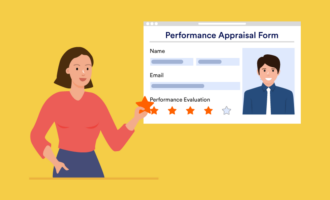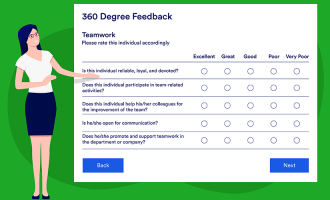Performance reviews can be nerve-racking for employees, but they offer managers valuable insights, revealing each team member’s performance, growth, and potential. They provide constructive feedback, build trust, and strengthen working relationships when done well.
The key is to strike a balance between assessing performance and showing support. Thoughtful, relevant questions help communicate that employees are valued, their development matters, and their voices are heard.
To help you make the most of these one-on-one sessions, here are 60 employee review questions to ask in your next performance review.
What are good performance review questions?
Good performance review questions should do more than assess employee achievements — they should also foster communication, encourage self-reflection, and open the door for growth. The best questions are:
- Open-ended and thoughtful
- Centered on both strengths and opportunities
- Aligned with personal and company goals
- Supportive rather than punitive
- Designed to encourage a two-way conversation
Whether you’re a manager looking to support your team or an HR professional developing a company-wide review system, asking the right questions will help you engage employees, provide meaningful feedback, and improve workplace performance.
Overall job performance
Since performance review questions can be especially stressful for employees, it’s best to start off with questions that encourage them to think about the positive aspects of their performance. This will start things on the right note and give you a sense of their perspective.
Create a performance review survey preloaded with these 60 questions.
- What are your proudest accomplishments this quarter/year? Why?
- What other goals have you achieved? How?
- What motivates you to do your best work?
- What made your greatest accomplishment at work this year so satisfying?
- In what ways do you think you’ve made a positive impact on your team this year?
Just so you know…
Ask employees the right questions during performance reviews so you can gain valuable insights and constructive feedback.
Employee strengths
Now that you have greater insight into their overall performance, it’s time to home in on why they have the job they do: their skills. By focusing on your employees’ strengths, you can assess whether their perceptions of their job performance align with yours and unlock some of their untapped potential.
- What are your top strengths?
- How do you use those strengths in this role?
- Are you underusing any of your skills in your role? How can we use them more effectively?
- What kind of work do you find easiest?
- What skill or quality do others most often praise you for?
Employee weaknesses
Though it’s difficult for anyone to evaluate their own shortcomings, this section is easily one of the most important to include in your employee review questions. By learning what your employees are struggling with or looking to improve, you can help them get where they need to be. Just remember to be constructive rather than critical in your feedback so you don’t discourage them from opening up to you.
- What do you see as your biggest opportunity for improvement?
- How are you going to actively work on it over the next year?
- Which deliverables or projects were you least proud of this year? Why?
- What was your biggest disappointment this year?
- What did you learn from it?
- What are your top three work goals this next year/quarter?
- What kind of work do you struggle with most?
- Are there any tools or resources that would help you overcome current challenges?
Current and future career outlook
You should have a robust understanding of your employees’ everyday tasks and responsibilities. Analyzing their workload can help you better support them and boost their motivation and productivity. By asking them about their plans, you can evaluate their drive and whether they feel sufficiently challenged, while also offering encouragement.
- Why are you the best person for your current position?
- What do you like most about your role?
- What do you like the least?
- Would you change anything about your current role? If so, what?
- What ideal working conditions maximize your productivity?
- Which job responsibilities are your favorite?
- Which are your least favorite?
- How does your role help the company meet its goals?
- Which parts of your job do you find most fulfilling?
- Which are most stressful and/or draining?
- How would you like to see your career grow?
- What are your short-term career goals?
- What are your long-term career goals?
- How would you like to develop within this company? Is there a different position you’re interested in or working toward? If so, why?
- What professional growth opportunities would you be willing to explore to get there?
- What can management do to support your overall performance and development?
End of year review questions
As the year comes to a close, it’s the perfect time to reflect on accomplishments, challenges, and personal growth. End-of-year review questions give employees a chance to evaluate their own performance, celebrate wins, and identify areas for improvement. These reflections provide valuable insights for future planning and help set clear, meaningful goals for the upcoming year — reinforcing a culture of growth, accountability, and continuous development.
- What achievement from this year are you most proud of?
- What was your biggest challenge this year and how did you overcome it?
- What feedback from this year stuck with you the most?
- How have you grown professionally over the past year?
- What would you like to do differently next year?
- Were your yearly goals clear and achievable?
- What is one new skill or knowledge area you gained this year?
- How do you think your role has evolved over the year?
- How has your performance contributed to team or company success this year?
- Looking back, what would you have done differently this year and why?
- How do you plan to maintain or improve your performance in the next year?
Manager-employee relationship
Performance reviews can be effective, in part, because they open lines of communication between managers and employees. But just as an employee has to be willing to receive constructive feedback, so, too, does their manager in order to make positive change.
- Do you feel comfortable giving me feedback?
- How can I alleviate your concerns or discomfort about giving me feedback?
- How do you prefer to receive feedback or recognition for your work?
- How do you think I can manage you more effectively?
- What do I do that you find most helpful in completing your work?
- What do I do that you find the least helpful?
- What can we do to improve our relationship?
- What could I do differently to support your goals more effectively?
Company culture
Strong work cultures are more likely to both attain and retain valuable employees (as well as be more productive overall), so it’s important to evaluate your company culture during performance reviews.
- Is there anything in your department that you believe needs work?
- How has your experience been with the management team and with your department?
- What do you most like about working for this company? What do you least like?
- What do you see as the company’s main drivers of success?
- Are you comfortable with our company culture?
- What can we improve?
- How can we become more inclusive and diverse?
How to prepare the performance review process
Performance reviews are only as effective as the process behind them. Whether you’re conducting end-of-year evaluations or routine quarterly check-ins, here are a few steps to set the stage for meaningful and productive conversations:
- Start with clear goals – Know what you’re assessing (e.g., individual performance, team fit, skill growth).
- Gather input – Build a complete picture by using self-assessments, peer reviews, and manager evaluations.
- Create a safe environment – Let employees know the goal is development, not punishment.
- Use a structured template – Consistent question categories help guide conversations and maintain fairness.
Offer feedback and next steps – End with actionable goals and an open invitation for ongoing dialogue.
Now that you have some standard employee evaluation questions in your back pocket, you can personalize them to match your company and brand. Online form builder Jotform can help with that, thanks to its wide variety of powerful, easy-to-use, and fully customizable employee evaluation form templates (like self-evaluation and supervisor evaluation forms). You can also start from scratch to create the perfect form for your performance review needs with Jotform’s drag-and-drop form builder to customize the layout, add rating scales and other question types, collect electronic signatures, and more.
Performance reviews can be trying for everyone involved, but they’re imperative for boosting employee morale, improving teamwork, and building a positive company culture. The more your employees feel supported and heard, the more motivated and engaged they’ll be, resulting in greater profitability, productivity, and employee retention.


























Send Comment:
1 Comments:
More than a year ago
Thanks for your article. But i do not see any question about Interpersonal skill reviews.
In an employee’s life-cycle interpersonal skills can impact positivity toward work, build better work relationships and enhance emotional intelligence.
You can find related questions here: